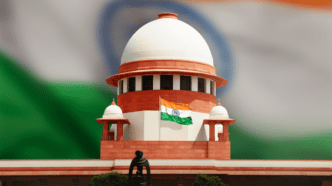In a significant blow to digital privacy advocates, the Karnataka High Court in India has ordered a nationwide block of Proton Mail, a popular encrypted email provider, following a complaint about offensive messages sent through the platform.
On Tuesday, Justice M Nagaprasanna directed the Indian government to block access to Proton Mail under the Information Technology Act, 2008, after hearing a case filed by M Moser Design Associates, a New Delhi-based design firm. The company alleged that its employees received obscene and vulgar emails sent through Proton Mail and argued that the email provider refused to cooperate with authorities.
Court Orders Block Amid Allegations and Privacy Concerns
In the hearing, streamed live on YouTube, the judge referenced Proton Mail’s failure to comply with requests for user information and instructed government authorities to act swiftly. The complaint, filed earlier in January, pushed for either regulation or a complete ban of Proton Mail in India.
M Moser Design Associates stated that despite lodging a police report, Proton Mail did not provide sender details. Because Proton Mail is based in Switzerland and offers end-to-end encryption, the company cannot view or share the contents of its users’ emails, nor can it easily identify the sender without legal proceedings in Swiss courts.
Representing the Indian government, Additional Solicitor General Aravind Kamath told the court that India might have limited jurisdiction over the issue. He suggested that criminal courts could initiate formal communication with Swiss authorities to obtain the necessary data.
Despite the court’s order, the Proton Mail website was still accessible in India at the time of publication, according to checks conducted. The company has not yet responded to the latest ruling. However, this is not the first time Proton Mail has come under fire in the country.
In 2023, the Tamil Nadu police department sought to ban Proton Mail after it was allegedly used to send hoax bomb threats to schools. The Ministry of Electronics and Information Technology (MeitY) reportedly asked internet service providers to block access. However, intervention from Swiss federal authorities prevented the ban from being enforced.
At the time, Proton responded strongly, saying that blocking its service would hurt ordinary users far more than criminals.
“Blocking access to Proton Mail simply prevents law-abiding citizens from communicating securely,” the company said. “It does not stop cybercriminals from using other email platforms, especially if they operate from outside India.”
Second Court Case in Two Years Signals Ongoing Friction
The Tuesday ruling marks the second attempt in two years to block Proton Mail in India. In October 2024, the Delhi High Court asked the state police and the Ministry of Home Affairs to investigate Proton Mail’s operations across the country. Additional Solicitor General Kamath previously assured the Karnataka High Court that those recommendations would be reviewed.
This growing legal pressure points to rising friction between India’s regulatory framework and foreign digital privacy services like Proton Mail. The platform, which is widely used by journalists, activists, and professionals for its privacy-first model, is facing increasing resistance from authorities in countries that demand access to user information during investigations.
It remains unclear how quickly the block will be enforced or how Proton Mail will respond. If the Indian government follows through, it could set a precedent affecting other encrypted services operating in India. For now, digital rights advocates warn that such moves could undermine online privacy, while doing little to deter bad actors who can switch to alternative platforms.













